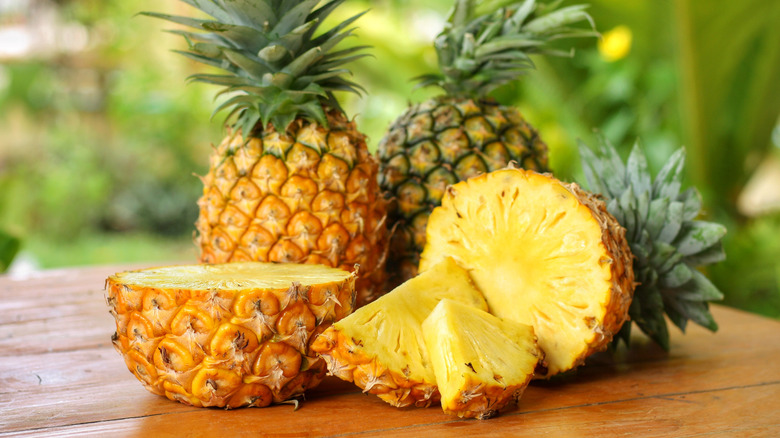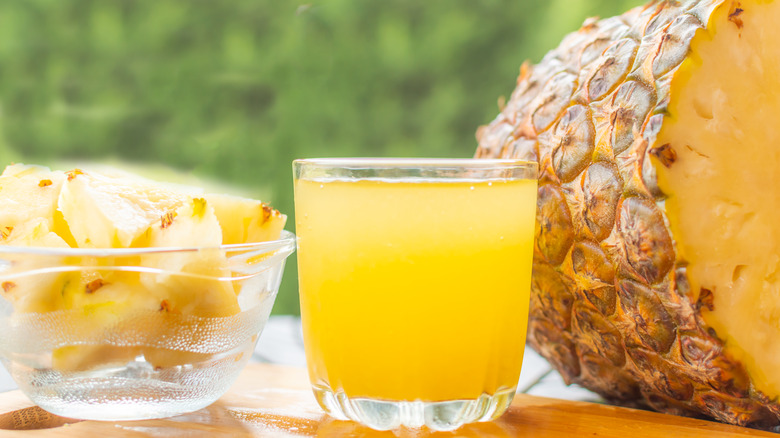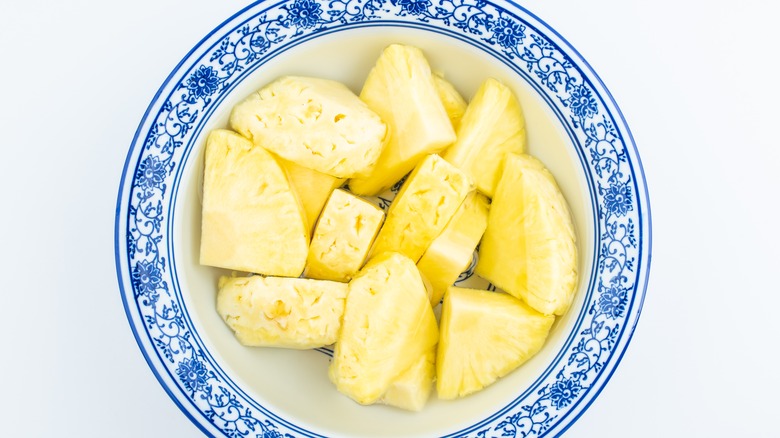Take The Sting Out Of Pineapple With A Salt Water Soak
Fresh, perfectly ripe pineapple is one of nature's most generous offerings. When you pick the right fruit at the store or farmers' market, the flavor is unparalleled and it's the ultimate treat. Pineapple is high in vitamin C and also provides essential nutrients that contribute to overall health, such as vitamin B6, copper, thiamine, folate, and potassium. However, it also has an enzyme called bromelain that can cause issues for some people.
If you've ever sliced up a pineapple and soon after eating it felt a tingling or itch in the mouth or throat, then bromelain is to blame, according to the medical journal Annals of Allergy, Asthma & Immunology. Some people react more strongly to it than others, but the good news is that there is a way to tame this enzyme with a simple trick so that by the time you cut up the pineapple and eat it, your mouth and throat will be right as rain. The secret weapon to subdue this flavorful delight may already reside in your pantry. Believe it or not, it's salt.
To reduce the sting of bromelain, you don't want to just load your pineapple up with salt before eating. There are a few methods you can use to make your pineapple itch-free so that the next time you buy one, you can be confident that it'll be a joyful experience starting from the very first bite.
Where the sting comes from
Unless you are actively allergic to pineapple or bromelain, then the tingling or itchy sensation it causes for some is not dangerous. Bromelain is actually not just one enzyme but a combination of two enzymes that aid in digestion. These enzymes, known as proteases, act by breaking down proteins, which is why they are a fantastic natural meat tenderizer.
If pineapple makes your mouth tingle or sting, it's because bromelain is doing its job. The enzyme removes the protective mucous on the tongue and in the mouth, which is why you feel a tingly, itchy, or burning sensation sometimes when eating it. Eating pineapple doesn't mean that the bromelain will be attempting to tenderize you on its entire journey through your digestive tract, though. The body regenerates any damaged cells, and the acids in the stomach protect you while digesting it.
Bromelain does have some positive properties as well. It's thought to reduce inflammation and pain, and in some cases can aid in digestion. With that said, if ingesting it makes you miserable, then you can still enjoy the additional health benefits as well as the great flavor of pineapple with the bromelain tamed with salt.
Salt water methods
There are two methods you can use to tame pineapple with salt. First and foremost, the stem of the pineapple contains the highest amounts of bromelain, so if you're sensitive to it, then cut the fruit away from the stem and core first. You can save the pineapple crowns for a tropical tea. When cutting up a pineapple, don't forget to remove the tough outer skin and the little brown eyes. Those can poke you, so you don't want to ingest them.
Once you've cut up your pineapple, you can treat it directly with a salt scrub, or you can use salt water. If you opt for the scrub method, then cover the pineapple thoroughly with table salt. Use a salt that has a finer grain than a chunky salt, so that you can get it into as much of the surface area as possible. After you've rubbed the salt into the pineapple, let it sit for a minute or two, and then give it a thorough rinse with water. You can also dunk your entire pineapple or slices in a saltwater solution made of 1 teaspoon kosher salt per cup of water used. Let the pineapple sit in the solution for a couple of minutes, and then rinse it thoroughly.
Still feeling some tingle? You could try grilling or roasting your pineapple, or perhaps adding it to your favorite shrimp skewers. The process of cooking will further neutralize the bromelain enzyme. Employ these strategies and savor the delightful taste of pineapple without any associated discomfort.



